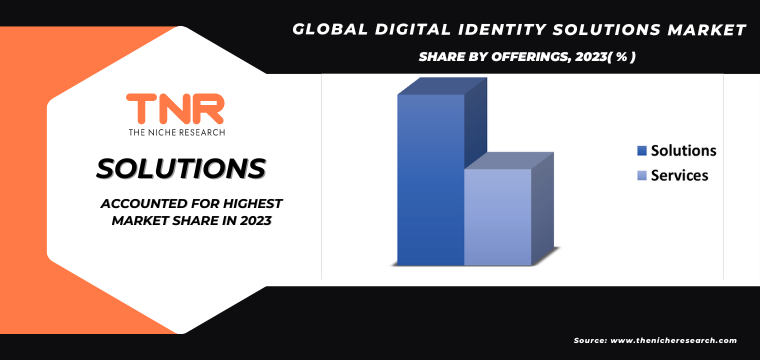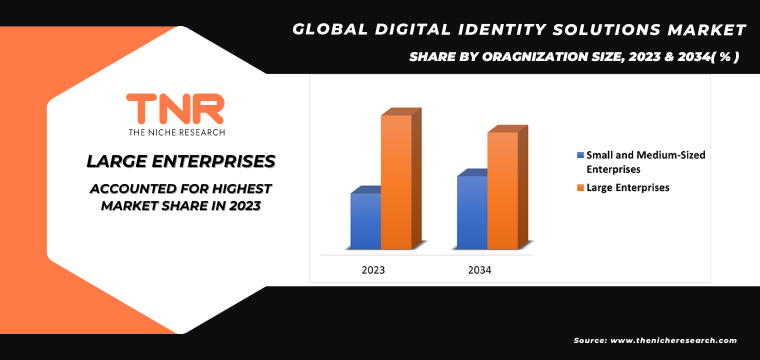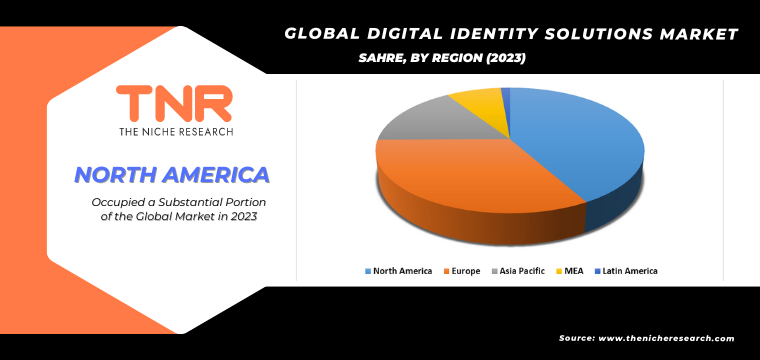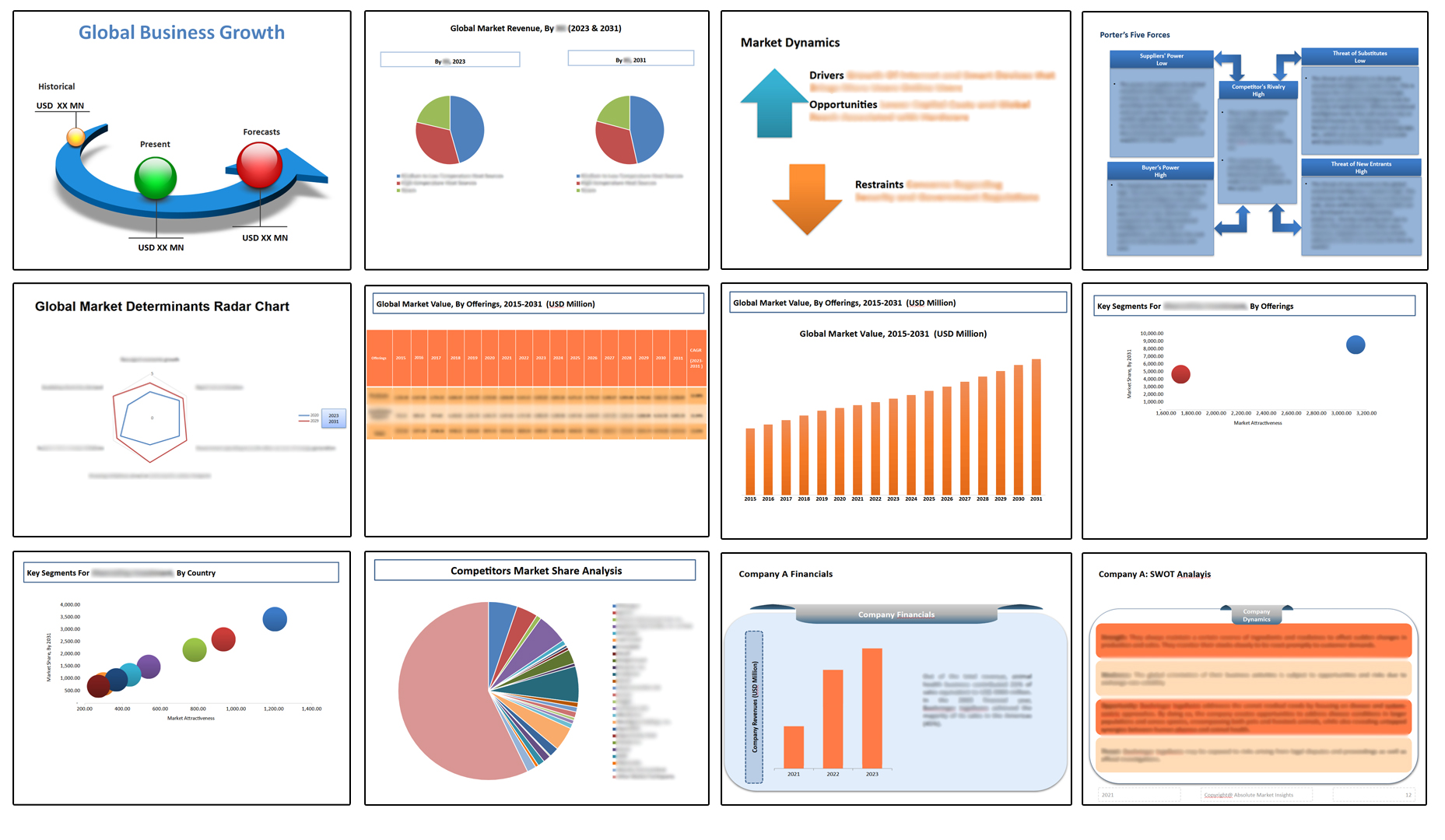Global Digital Identity Solutions Market: By Offering, By Deployment Type, By Application, By Identity Type, By Organization Size, By Industry Vertical, By Region & Segmental Insights Trends and Forecast, 2024 – 2034
- Industry: Technology
- Report ID: TNR-110-1275
- Number of Pages: 420
- Table/Charts : Yes
- August, 2024
- Base Year : 2024
- No. of Companies : 10+
- No. of Countries : 29
- Views : 10061
- Covid Impact Covered: Yes
- War Impact Covered: Yes
- Formats : PDF, Excel, PPT
Digital identity solutions are technologies and systems that allow individuals, organizations, and devices to establish and verify their identities in the digital world. They provide a secure and reliable way to interact with online services, ensuring privacy and preventing unauthorized access. Global digital identity solutions market is a rapidly evolving sector driven by the increasing demand for secure digital identification methods across various industries. As businesses and government bodies transition towards digital platforms, the need for robust identity verification systems has grown significantly.
Digital identity solutions market has seen substantial growth in recent years, propelled by the rising adoption of digital services across various sectors, including banking, financial services, and insurance (BFSI), healthcare, government, and e-commerce. Digital identity solutions are crucial for ensuring secure access, preventing fraud, and maintaining the integrity of online transactions.
Market Size: In 2023, the global digital identity solutions market recorded revenue worth USD 32.54 Bn. The market is expected to grow at a compound annual growth rate (CAGR) of 18.3% from 2024 to 2034, reaching an estimated value of USD 138.2 Bn by 2034.
User Base Growth: The number of digital identity users globally is projected to increase from 4.2 billion in 2023 to 6.1 billion by 2030, reflecting the growing integration of digital identity solutions into everyday transactions.
Global Digital Identity Solutions Market Drivers
Increasing Cybersecurity Threats: The surge in cyberattacks and data breaches has underscored the need for robust digital identity solutions. In 2023, the average cost of a data breach reached USD 4.35 million, driving organizations to invest in sophisticated identity verification systems to safeguard sensitive information.
Regulatory Compliance: Stringent regulations such as the General Data Protection Regulation (GDPR) in Europe, the California Consumer Privacy Act (CCPA) in the United States, and similar laws in other regions are driving the adoption of digital identity solutions market. Compliance with these regulations is mandatory for organizations handling personal data, leading to a significant increase in demand for identity solutions that ensure data privacy and security.
Proliferation of Digital Services: The rapid expansion of digital services in sectors such as banking, e-commerce, healthcare, and government has created a critical need for secure digital identity solutions. As of 2023, 85% of global financial institutions had integrated digital identity solutions into their operations, up from 60% in 2018.
Advancements in Biometric Technologies: Continuous advancements in biometric technologies, such as the development of contactless biometrics and improved facial recognition algorithms, are driving the adoption of biometric authentication methods. These technologies offer higher accuracy, speed, and convenience, making them increasingly popular among consumers and organizations.
Remote Workforce Expansion: The rise of remote work, accelerated by the COVID-19 pandemic, has necessitated the adoption of digital identity solutions to ensure secure access to corporate networks and resources. By 2023, 70% of organizations had implemented digital identity solutions to manage remote access, a figure expected to rise to 85% by 2025.
Market Challenges
Privacy Concerns: Despite the benefits, digital identity solutions raise concerns about data privacy and the potential for misuse of personal information. Organizations must address these concerns by implementing robust data protection measures and ensuring transparency in how data is collected, stored, and used.
High Implementation Costs: The cost of deploying advanced digital identity solutions can be prohibitive, especially for small and medium-sized enterprises (SMEs). Costs associated with specialized hardware, software, and ongoing maintenance can limit market penetration in certain sectors.
Segmental Insights: Global Digital Identity Solutions Market

The solutions segment led the digital identity solutions market in 2023, primarily due to the growing need for robust identity verification and authentication tools across various industries. As digital transactions and online interactions increase, organizations are prioritizing secure and reliable methods to verify user identities, mitigate fraud, and comply with stringent data protection regulations. For instance, in the financial sector, banks and fintech companies are heavily investing in advanced identity verification solutions to prevent fraud and ensure compliance with regulations like KYC (Know Your Customer) and AML (Anti-Money Laundering). Companies like NEC Corporation and Gemalto (Thales Group) have introduced comprehensive digital identity platforms that integrate biometric authentication, multi-factor authentication (MFA), and identity governance, making them indispensable for businesses aiming to enhance security and streamline user experiences. The increasing adoption of cloud-based solutions has also fuelled the growth of this segment, as organizations seek scalable and cost-effective ways to manage digital identities.
The biometric segment dominated the digital identity solutions market in 2023, fuelled by the rising need for authentication methods that are not only highly secure but also seamless and convenient for users. Biometric technologies, such as fingerprint recognition, facial scanning, and iris detection, provide a level of security that is unmatched by traditional methods, as they rely on unique physical attributes that are nearly impossible to duplicate. This makes them particularly valuable in sectors like finance, healthcare, and government, where safeguarding sensitive information is critical. For instance, leading financial institutions like Wells Fargo and Standard Chartered have adopted biometric systems for customer authentication in their mobile banking services, offering enhanced security without compromising user convenience. Similarly, in the healthcare industry, hospitals and clinics are increasingly using biometric systems to accurately verify patient identities, ensuring that medical records are correctly linked to the right individuals and reducing the risk of identity-related errors or fraud. The widespread availability of smartphones equipped with biometric features has also driven consumer adoption, reinforcing the segment’s leadership in the market.

The on-premises segment led the Digital Identity Solutions Market in 2022, accounting for over 60% of global revenue, largely because large enterprises possess the necessary infrastructure to deploy and manage their digital identity solutions on-site. This preference for on-premises solutions is particularly strong among organizations that handle highly sensitive data, such as financial institutions, government agencies, and healthcare providers, where data security and control are paramount. By deploying identity solutions on-premises, these organizations can maintain full control over their data, ensuring compliance with stringent internal security protocols and regulatory requirements. For instance, global financial giants like JPMorgan Chase and Bank of America have heavily invested in on-premises identity management systems to secure their vast databases of customer information and transaction records. Additionally, on-premises solutions allow for greater customization to meet specific business needs, which is a critical factor for large enterprises with complex IT environments. This demand for secure, customizable, and controlled identity management solutions has solidified the on-premises segment’s dominance in the market.

The IT and Telecommunication sector accounted for a substantial share of the digital identity solutions market in 2023, driven by the sector’s critical need for secure, scalable, and efficient identity management systems. With the rapid expansion of digital services, cloud computing, and mobile applications, companies in this sector face heightened risks of cyber threats and data breaches, making robust digital identity solutions essential. In 2023, approximately 40% of the major IT and telecommunication companies globally had fully integrated digital identity solutions into their operations, a significant increase from 25% in 2020. For example, Verizon has implemented advanced identity verification systems to secure its vast network infrastructure and protect customer data. Similarly, AT&T has adopted multi-factor authentication (MFA) and biometric solutions to safeguard access to its services and prevent unauthorized access. These companies also leverage digital identity solutions to enhance user experience, streamline customer onboarding, and ensure compliance with stringent regulations like GDPR and CCPA. As a result, the IT and Telecommunication sector’s demand for advanced identity solutions has been a major driver of market growth, contributing significantly to the overall expansion of the digital identity solutions market.

Europe accounted for the second-highest share in the digital identity solutions market in 2023, representing over 38% of global revenue. This significant market share is driven by the region’s strong emphasis on data protection and privacy, underpinned by regulatory frameworks such as the General Data Protection Regulation (GDPR). European businesses, particularly in sectors like banking, healthcare, and government, have prioritized the adoption of advanced digital identity solutions to ensure compliance with these stringent regulations. For example, in the financial sector, institutions such as Deutsche Bank and HSBC have implemented robust identity verification systems to meet GDPR requirements while protecting customer data from breaches. Additionally, European government bodies are investing heavily in national digital identity programs, like eIDAS (Electronic Identification, Authentication, and Trust Services), which further bolster the demand for secure identity solutions across the continent. This strong regulatory environment, combined with widespread adoption of digital services, has solidified Europe’s position as a leading digital identity solutions market.
Competitive Insights: Global Digital Identity Solutions Market
- Daon, Inc.
- ForgeRock, Inc.
- GB Group plc
- IDEMIA
- ImageWare Systems, Inc.
- NEC Corporation
- SailPoint Technologies, Inc.
- SAMSUNG SDS
- Saviynt Inc.
- TELUS Communications Inc.
- Thales
- Other Market Participants
Global Digital Identity Solutions Market: Key Specs
| Report Specifications | Details |
| Market Revenue in 2023 | US$ 32.54 Bn |
| Market Size Forecast by 2034 | US$ 138.2 Bn |
| Growth Rate (CAGR) | 18.3% |
| Historic Data | 2016 – 2022 |
| Base Year for Estimation | 2023 |
| Forecast Period | 2024 – 2034 |
| Report Inclusions | Market Size & Estimates, Market Dynamics, Competitive Scenario, Trends, Growth Factors, Market Determinants, Key Investment Segmentation, Product/Service/Solutions Benchmarking |
| Segments Covered | By Offering, By Deployment Type, By Application, By Identity Type, By Organization Size, By Industry Vertical |
| Regions Covered | North America, Europe, Asia Pacific, Middle East & Africa, Latin America |
| Countries Covered | U.S., Canada, Mexico, Rest of North America, France, The UK, Spain, Germany, Italy, Nordic Countries (Denmark, Finland, Iceland, Sweden, Norway), Benelux Union (Belgium, The Netherlands, Luxembourg), Rest of Europe, China, Japan, India, New Zealand, Australia, South Korea, Southeast Asia (Indonesia, Thailand, Malaysia, Singapore, Rest of Southeast Asia), Rest of Asia Pacific, Saudi Arabia, UAE, Egypt, Kuwait, South Africa, Rest of Middle East & Africa, Brazil, Argentina, Rest of Latin America |
| Key Players | Daon, Inc.,ForgeRock, Inc.,GB Group plc,IDEMIA ,ImageWare Systems, Inc.,NEC Corporation,SailPoint Technologies, Inc.,SAMSUNG SDS,Saviynt Inc.,TELUS Communications Inc.,Thales, Other Market Participants |
| Customization Scope | Customization allows for the inclusion/modification of content pertaining to geographical regions, countries, and specific market segments. |
| Pricing & Procurement Options | Explore purchase options tailored to your specific research requirements |
| Contact Details | Consult With Our Expert
Japan (Toll-Free): +81 663-386-8111 South Korea (Toll-Free): +82-808- 703-126 Saudi Arabia (Toll-Free): +966 800-850-1643 United Kingdom: +44 753-710-5080 United States: +1 302-232-5106 E-mail: askanexpert@thenicheresearch.com
|
Global Digital Identity Solutions Market
By Offering
- Solution
- Services
By Deployment Type
- Cloud
- On Premises
By Application
- Authentication
- Single-factor Authentication
- Multi-factor Authentication
- Access and Lifecycle Management
- Authorization
- Others
By Identity Type
- Biometric
- Voice Recognition
- Facial Recognition
- Fingerprint Recognition
- Palm/Hand Recognition
- Others
- Non-biometric
By Organization Size
- Large Enterprises
- Small and Medium Enterprises (SMEs)
By Industry Vertical
- Banking, Financial Services, and Insurance
- Healthcare
- Retail and Ecommerce
- Energy and Utilities
- IT and Telecommunication
- Travel & Hospitality
- Government and Defence
- Others
By Region
- North America (U.S., Canada, Mexico, Rest of North America)
- Europe (France, The UK, Spain, Germany, Italy, Nordic Countries (Denmark, Finland, Iceland, Sweden, Norway), Benelux Union (Belgium, The Netherlands, Luxembourg), Rest of Europe)
- Asia Pacific (China, Japan, India, New Zealand, Australia, South Korea, Southeast Asia (Indonesia, Thailand, Malaysia, Singapore, Rest of Southeast Asia), Rest of Asia Pacific)
- Middle East & Africa (Saudi Arabia, UAE, Egypt, Kuwait, South Africa, Rest of Middle East & Africa)
- Latin America (Brazil, Argentina, Rest of Latin America)
Global Digital Identity Solutions Market: Report Layout

Table of Contents
Note: This ToC is tentative and can be changed according to the research study conducted during the course of report completion.
**Exclusive for Multi-User and Enterprise User.
Global Digital Identity Solutions Market
By Offering
- Solution
- Services
By Deployment Type
- Cloud
- On Premises
By Application
- Authentication
- Single-factor Authentication
- Multi-factor Authentication
- Access and Lifecycle Management
- Authorization
- Others
By Identity Type
- Biometric
- Voice Recognition
- Facial Recognition
- Fingerprint Recognition
- Palm/Hand Recognition
- Others
- Non-biometric
By Organization Size
- Large Enterprises
- Small and Medium Enterprises (SMEs)
By Industry Vertical
- Banking, Financial Services, and Insurance
- Healthcare
- Retail and Ecommerce
- Energy and Utilities
- IT and Telecommunication
- Travel & Hospitality
- Government and Defence
- Others
By Region
- North America (U.S., Canada, Mexico, Rest of North America)
- Europe (France, The UK, Spain, Germany, Italy, Nordic Countries (Denmark, Finland, Iceland, Sweden, Norway), Benelux Union (Belgium, The Netherlands, Luxembourg), Rest of Europe)
- Asia Pacific (China, Japan, India, New Zealand, Australia, South Korea, Southeast Asia (Indonesia, Thailand, Malaysia, Singapore, Rest of Southeast Asia), Rest of Asia Pacific)
- Middle East & Africa (Saudi Arabia, UAE, Egypt, Kuwait, South Africa, Rest of Middle East & Africa)
- Latin America (Brazil, Argentina, Rest of Latin America)
The Niche Research approach encompasses both primary and secondary research methods to provide comprehensive insights. While primary research is the cornerstone of our studies, we also incorporate secondary research sources such as company annual reports, premium industry databases, press releases, industry journals, and white papers.
Within our primary research, we actively engage with various industry stakeholders, conducting paid interviews and surveys. Our meticulous analysis extends to every market participant in major countries, allowing us to thoroughly examine their portfolios, calculate market shares, and segment revenues.
Our data collection primarily focuses on individual countries within our research scope, enabling us to estimate regional market sizes. Typically, we employ a bottom-up approach, meticulously tracking trends in different countries. We analyze growth drivers, constraints, technological innovations, and opportunities for each country, ultimately arriving at regional figures.Our process begins by examining the growth prospects of each country. Building upon these insights, we project growth and trends for the entire region. Finally, we utilize our proprietary model to refine estimations and forecasts.
Our data validation standards are integral to ensuring the reliability and accuracy of our research findings. Here’s a breakdown of our data validation processes and the stakeholders we engage with during our primary research:
- Supply Side Analysis: We initiate a supply side analysis by directly contacting market participants, through telephonic interviews and questionnaires containing both open-ended and close-ended questions. We gather information on their portfolios, segment revenues, developments, and growth strategies.
- Demand Side Analysis: To gain insights into adoption trends and consumer preferences, we reach out to target customers and users (non-vendors). This information forms a vital part of the qualitative analysis section of our reports, covering market dynamics, adoption trends, consumer behavior, spending patterns, and other related aspects.
- Consultant Insights: We tap into the expertise of our partner consultants from around the world to obtain their unique viewpoints and perspectives. Their insights contribute to a well-rounded understanding of the markets under investigation.
- In-House Validation: To ensure data accuracy and reliability, we conduct cross-validation of data points and information through our in-house team of consultants and utilize advanced data modeling tools for thorough verification.
The forecasts we provide are based on a comprehensive assessment of various factors, including:
- Market Trends and Past Performance (Last Five Years): We accurately analyze market trends and performance data from preceding five years to identify historical patterns and understand the market’s evolution.
- Historical Performance and Growth of Market Participants: We assess the historical performance and growth trajectories of key market participants. This analysis provides insights into the competitive landscape and individual company strategies.
- Market Determinants Impact Analysis (Next Eight Years): We conduct a rigorous analysis of the factors that are projected to influence the market over the next eight years. This includes assessing both internal and external determinants that can shape market dynamics.
- Drivers and Challenges for the Forecast Period:Identify the factors expected to drive market growth during the forecast period, as well as the challenges that the industry may face. This analysis aids in deriving an accurate growth rate projection.
- New Acquisitions, Collaborations, or Partnerships: We keep a close watch on any new acquisitions, collaborations, or partnerships within the industry. These developments can have a significant impact on market dynamics and competitiveness.
- Macro and Micro Factors Analysis:A thorough examination of both macro-level factors (e.g., economic trends, regulatory changes) and micro-level factors (e.g., technological advancements, consumer preferences) that may influence the market during the forecast period.
- End-User Sentiment Analysis: To understand the market from the end-user perspective, we conduct sentiment analysis. This involves assessing the sentiment, preferences, and feedback of the end-users, which can provide valuable insights into market trends.
- Perspective of Primary Participants: Insights gathered directly from primary research participants play a crucial role in shaping our forecasts. Their perspectives and experiences provide valuable qualitative data.
- Year-on-Year Growth Trend: We utilize a year-on-year growth trend based on historical market growth and expected future trends. This helps in formulating our growth projections, aligning them with the market’s historical performance.
Research process adopted by TNR involves multiple stages, including data collection, validation, quality checks, and presentation. It’s crucial that the data and information we provide add value to your existing market understanding and expertise. We have also established partnerships with business consulting, research, and survey organizations across regions and globally to collaborate on regional analysis and data validation, ensuring the highest level of accuracy and reliability in our reports.









